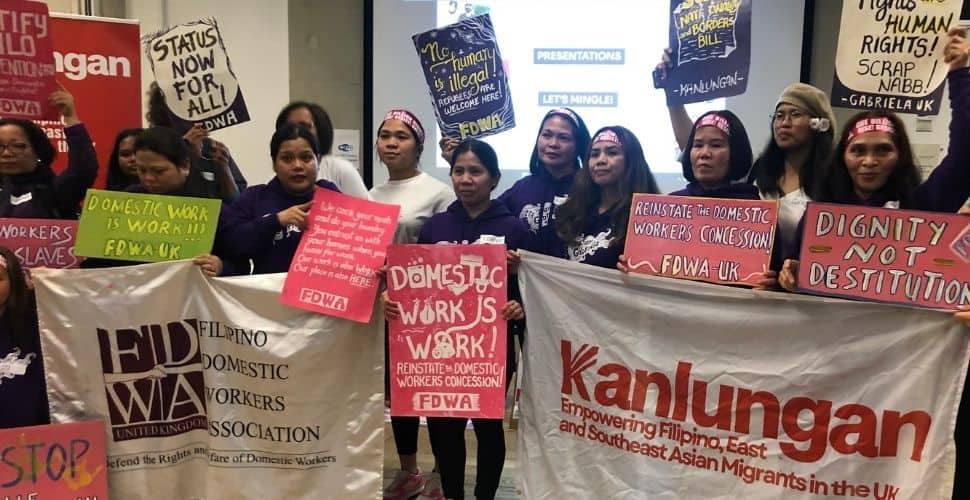Domestic workers undertake vital work in households around the world including childcare, cleaning, cooking, caring for the sick and elderly, and general home maintenance. The work is difficult, and though absolutely necessary to keep our societies going, often undervalued and low-paid.
It’s been ten years since the U.K. government implemented a harmful policy tying migrant domestic workers’ visas to their employers. This change in 2012 unequivocally increased migrant domestic workers’ vulnerability to modern slavery and human trafficking. The isolated nature of domestic work combined with the worker’s extreme dependency on an employer and a lack of rights, means they are especially vulnerable to exploitation and abuse.
Prior to the 2012 change, domestic workers from overseas would be allowed to change employers and, after five years, apply for secure immigration status in the U.K. known as indefinite leave to remain. Eventually, this group of workers would also be able to apply for full U.K. citizenship.
The conditions under this original Overseas Domestic Worker visa meant that migrant domestic workers had the power to leave abusive employers and find alternative employment without risking becoming undocumented.
The loss of hard-won rights after 2012
But in 2012, the system changed for the worse. Migrant domestic workers were only able to enter and work in the U.K. on a six-month non-renewable visa, with their immigration status tied to their employer – in the Middle East, this is commonly known as the kafala system.
Furthermore, there would no longer be a route to settlement for migrant domestic workers in the U.K.
In the years that followed, the U.K. took on a self-styled role as a world leader in tackling modern slavery, even passing the Modern Slavery Act in 2015. At the same time, the U.K. refused to put an end to the tied visa system even though all evidence pointed to migrant domestic workers being at greater risk of trafficking as a direct result.
Migrant domestic workers aren’t giving up
Today, domestic workers are still fighting to have their rights restored with one simple, achievable ask: a return to the pre-2012 Overseas Domestic Worker visa with a route to secure immigration status.
In March, the government backed a recommendation by the Low Pay Commission to change minimum wage laws to include live-in domestic workers. This was a significant win to close a loophole known as the “family worker exemption,” which left live-in domestic workers vulnerable to exploitation.
Yet, failing to dismantle restrictive visas for migrant domestic workers means they are still vulnerable to exploitation from abusive employers.
Writing for gal-dem, Phoebe Dimacali and Francesca Humi from the Filipino Domestic Workers’ Association and Kanlungan Filipino Consortium explain:
A reformed ODW visa is an essential first step in preventing abuse and exploitation. It must allow workers to change employers, enforce rights in the workplace, give them the option to report abuse and guarantee their rights in the workplace, renew their visas and allow them to be joined by their spouses and children – in short, giving migrant domestic workers the right to work and settle in the UK like other migrant workers.
[…]
The call from migrant domestic workers is simple: you entrust us with your houses, your children, your elderly – isn’t it time we were granted basic rights in this country? We call on the Government to reinstate the Overseas Domestic Workers visa. Domestic work is work. Migrants’ rights are human rights.
A survey carried out by Freedom United partner organization, the Voice of Domestic Workers, found that in the U.K.:
- 77% of migrant domestic workers experienced physical, verbal or sexual abuse;
- 51% reported that they were not given enough food;
- 61% were not given their own space in employers’ houses.
Freedom United has been campaigning for years alongside domestic workers in the U.K. urging for the restoration of migrant domestic workers’ rights. We’re not giving up. Join the campaign today and let’s keep pushing the government to do the right thing.







Freedom United is interested in hearing from our community and welcomes relevant, informed comments, advice, and insights that advance the conversation around our campaigns and advocacy. We value inclusivity and respect within our community. To be approved, your comments should be civil.